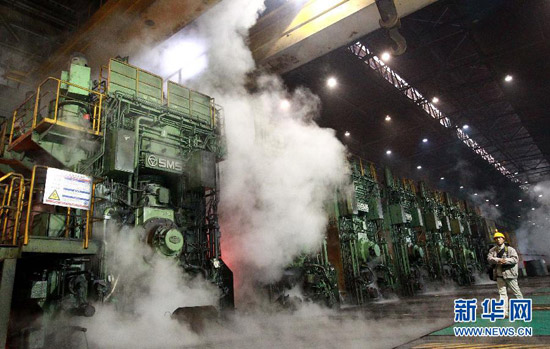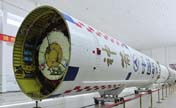
 |
| An undated file photo shows a plant of Baoshan Iron & Steel Co. (Photo/Xinhua) |
Despite expectations that China's steel demand would rebound this year along with massive infrastructure investment, insiders told the Global Times Sunday that many steel makers are still having a difficult time and are expected to lower factory prices for major steel products.
"Although the country has a lot of ongoing infrastructure construction projects, market pressure has forced us to cut steel prices," Deng Qilin, CEO of State-owned Wuhan Iron and Steel Group Corporation, told the Global Times Sunday.
Deng's company is not alone in facing difficulties. Other large steel firms, including Baoshan Iron & Steel Co, Shougang Group and Jiangsu Shagang Group, have also reduced their steel prices, so as to remain competitive in the market.
The cut in prices came as something of a surprise, an industry insider who wished to remain anonymous told the Global Times Sunday.
Earlier in the year many manufacturers had "very positive expectations that the sector would see increasing earnings, and they were planning to raise prices," the insider said.
This was mainly because late last year the National Development and Reform Commission, the country's top economic planner, approved a new round of economic stimulus plans, including urban railway projects worth as much as 650 billion yuan ($105 billion) for 2013.
Earlier this year, market analysts said they expected a rebound in demand for steel, which led some companies to increase their inventories.
The total stockpiles of five major steel products in 22 cities reached a record of 15.57 million tons in March, an increase of 22.9 percent month-on-month, according to the China Iron and Steel Association (CISA).
"But the expectations of rising demand turned out to be false," said the insider, noting that it was poor sales performance that triggered producers' decisions to cut prices.
Wang Guoqing, a senior analyst at Beijing Lange Steel Information Research Center, echoed this sentiment.
Wang told the Global Times Sunday that when the country changed to its new leadership in March, local governments also changed their leaders, and new administrations are generally inclined to be more cautious about infrastructure projects amid rising debts.
"Therefore, some railway projects were delayed, which directly impacted steel demand," said Wang.
Also, in the past, construction companies bought large quantities of steel as they were concerned about possible price hikes.
But now, the steel industry's overcapacity problem is well-known and price rises are less likely, so many construction firms buy smaller amounts to cover just their current needs, Wang said.
According to a report released by the CISA at the end of last month, in March, 45.3 percent of its 272 member companies were in the red.
This showed that the industry is still "weak" because of fiercer competition amid industrial overcapacity, said Zhu Jimin, the CISA's vice chairman.
















 Brazilian self-defense martial art gains popularity in Beijing
Brazilian self-defense martial art gains popularity in Beijing


![]()
